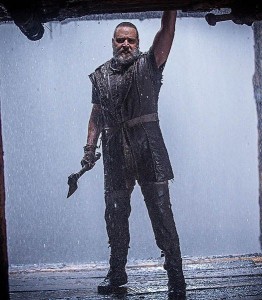“Noah”: An Old-School Blockbuster

Kyle Garrett, Staff Writer
(This review is dedicated to Roger Ebert, who left us one year ago last week.)
Hollywood and scripture have a long, storied history together. Darren Aronofsky’s “Noah” is the newest entry to a genre that has been mostly dead since the insane anti-Semitic torture known as “The Passion of the Christ” and also one of the most besieged productions in recent memory, the fundamentalist crowd trashed it for taking liberties with scripture, while faux-intellectuals and internet atheist types sneered and treated it as an excuse to take more swipes at religion.
Both sides should have looked closer at who was in charge of the project. Aronofsky hit it out of the park with “Black Swan” and “The Fountain,” and “Noah” is his riskiest project yet. He blends the Old Testament, apocrypha and his own adaptational hand to recapture the spirit of Cecil B. DeMille and produce the most sociopolitically serious Bible movie since Michael Curtiz’ own adaptation of the Noah’s Ark story way back in 1929, which had the world-destroying flood standing in as an allegory for the First World War.
Aronofsky turns his eye instead to climate change, and at a time where scientists predict entire cities will be underwater in decades and NASA has thrown up its hands and declared all civilisation doomed this film comes in like a punch to the stomach. Rather than deliver his warnings through a two-hour lecture, Aronofsky shows us a daring, gorgeous, horrific movie that is both brilliant and as entertaining as any summer blockbuster.
By now everyone knows the story. The world is covered by the descendants of Cain and Seth, Old Testament God tells Noah to build an ark and put his family and two of every kind of animal on it, repopulate the earth et cetera.
Here, though, Noah (Russell Crowe) is a dead-eyed survivalist who hates all his fellow man because they dare live in cities and eat meat.
When the messages from on high come, they aren’t actual speech but visions and fever dreams. The film portrays Noah as both genuinely divinely inspired and absolutely mad, as if interacting on a personal level with an omnipotent cosmic entity is something the human mind simply isn’t equipped to handle without losing something of itself in the process.
The psychological reaction to the whims of the otherworldly, or more mundanely just things that are completely out of human control, is a theme that follows the film throughout. While Noah throws himself completely into belief in the Creator’s justice, his rival Tubal-cain (Ray Winstone) holds to his conviction that human strength of arms and force of will can overcome any obstacle. As Noah goes completely off the deep end after the flood and decides his family are to die once the storm passes so humanity can be rendered extinct, he so alienates all he brought aboard the ark his that sons Shem (Douglas Booth) and Ham (Logan Lerman) prepare to commit patricide.
The plot leads to a bloody faceoff below decks that, while resolved a bit conveniently and tasting a bit of villainization of secular humanism, serves as an effective climax and forced confrontation between all the characters aboard and their own inner darkness, as well as the very ideas of willing submission to a higher power vs. human self-determination.
The wheeling around between genres, from intense character moments to thrilling action beats to haunted house thriller, shouldn’t hold up, especially given how obviously manufactured the third act drama is, but it is held up by incredible performances by the core cast.
Where this film most delivers, however, is the visuals. CGI and practical effects merge seamlessly to bring to life a world of ancient, terrifying power, where everything has a real sense of weight and presence.
“Noah” is an epic melodrama that fits our current age all too well, and is a plea for sense and reconciliation.
